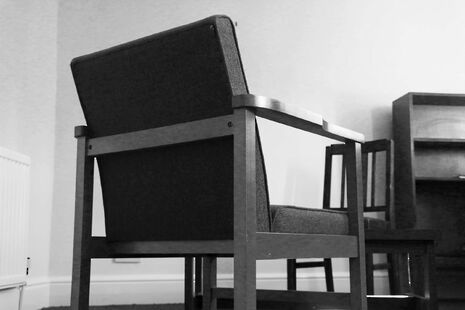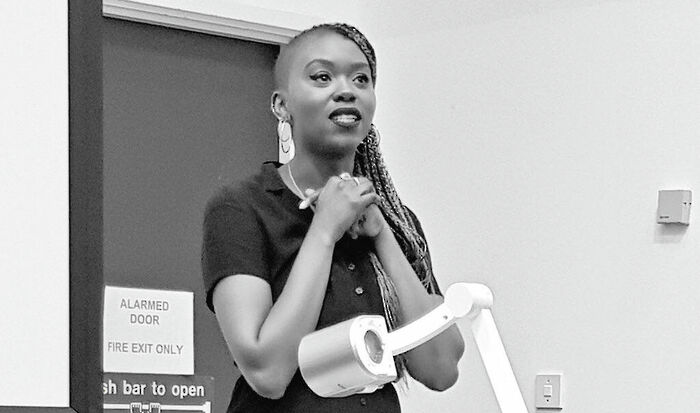Cambridge's Disciplinary Procedure
Two students speak out about the lapses in their college disciplinary procedures
Both reported dealing with professors’ sexual misconduct to their colleges. Both said they felt they weren’t taken seriously.

Content note: the following article contains discussion relating to sexual assault
The past year in Cambridge has seen existing procedures for the handling of cases of sexual misconduct come under a process of questioning.
Breaking the Silence – a centralised campaign by the University to tackle sexual harassment – was launched in October, and last term CUSU Women’s Campaign campaigned for a change in the University’s disciplinary procedure standard of proof from proof ‘beyond reasonable doubt’ to a ‘balance of probabilities’.
Amid the attention that the University and campaigners have placed on the issue of sexual misconduct, two students spoke out on the bureaucratic pushback they faced when they complained to college administration about experiences related to the issue.
As part of one student’s course last year, she was placed into contact with someone she later found out was a convicted paedophile. The professor was found in 2008 to possess images of child pornography. He was arrested that year and given a twelve-month suspended sentence for rehabilitation, during which he was given full pay by the University, and told he could return to work the following April.
“I remember thinking [that I wanted to do something to] shock me back into some kind of reality because I didn’t have a grip on it”
He returned to Cambridge under restrictions from the University that he would only teach those who consented to work with him and that he would not be allowed contact with anyone under the age of 16.
“[After I found out, I] walked straight back to college and didn’t really breathe until I got back to my room. I wanted to throw up.
“When I was [younger], I was raped by a guy who was significantly older than me. He was in the sixth form of my school.
“I decided to go to the police about it because I wanted to press charges, or at least scare him so he wouldn’t do it again.
Is Cambridge doing enough to break the silence?
Write for Varsity and have your say. Just email our Opinion team with a 100-word pitch.
“I was going to do it quietly – I didn’t want anyone in my school to find out. But [after I spoke] to my school and the police about it, at some point he was spoken to, and as soon as he realised I was talking about it, he immediately spread around that I was lying, that this never happened, that I was a liar, like people do to victims of sexual assault.”
“[After hearing of the professor’s criminal history] my brain was just spiralling. I remember thinking [that I wanted to do something to] shock me back into some kind of reality because I didn’t have a grip on it,” she said.
When she took this to a college administrator, she was told that everyone in the faculty really trusted him. She said she was asked to “offer how to solve the entire university system … as if it was me, solely, who had to do this,” with questions like, ‘What would you do? What would you do if we started running supervisor checks?’
“I didn’t want to do this loudly,” she said. “I just wanted students to be informed and lectures to be recorded in future, so that students would have the choice about whether to go, but it just seemed like it was blown out of proportion because of the intermediary that I had.”
She was told to keep this quiet. “[I was told], pretty much verbatim: don’t take this to the student press, don’t take it to Varsity; the faculty hates it when things like this come out in the papers; things will grind to a halt, nothing will get done, and it will reflect really badly, which was… terrifying.”
“[I was told], pretty much verbatim: don’t take this to the student press”
In Easter, on the day of one of her exams she got a text from a friend who had been assigned the same pair of examiners: she had been examined by the professor after the faculty made a switch.
It was two hours until her exam. She thought maybe she wouldn’t take the exam and miss out on the marks. “I spent the entire day sobbing.”
Towards the end of the day she was told that an alternative arrangement had been put in place for her. “[They] expected me to trust [them] when my experience … was so negative.”
In a separate instance, a student at a different college filed a complaint about her supervisor after noticing his prolonged inappropriate behaviour. Parts of her course involve reading texts with sexually explicit content, and in one supervision the supervisor had demonstrated fingering someone. In a separate supervision, “he felt the need to tell me how a man felt about oral sex,” and reportedly “said stuff like oral sex is an act of charity from a woman to a man.” She said: “It wasn’t really part of the literary analysis anymore, was it?”
She’s spoken to some of his other students – “they all say he’s creepy, and that he brings up sex a lot.”
When she took it to the college, they informed her that filing an official complaint would involve speaking to him about her complaints, which she wasn’t prepared to do. She asked if she could just switch supervisors, but the college refused. “They told me I’d have to keep going to [his] supervisions or I’d have to intermit.”
She was facing mental health issues at the same time, and said she was struggling to go about her normal life. “I didn’t have the energy to fight with my college for what I want.”
“They told me I’d have to keep going to [his] supervisions or I’d have to intermit”
She thought, “I don’t have any evidence, I don’t have a recorder, there isn’t enough to have him removed very far away from me… At the end of the day I’m not going to win this because I don’t have enough on my side. Everything is on me, not him. He can continue normally, but I would have to sacrifice part of my life. I would get grilled.”
“He’s seen as this genius in his field, as this extremely intelligent man. People see him as a weird figure who has quirks … and he’s also seen as bit of a dinosaur … so people just accept these things about him.”
The supervision system creates intimate environments between students and supervisors. The one-on-one supervision systems in many humanities courses has the potential to place students in more vulnerable positions. In certain cases they may not have others in the room to back them up about an incident they wish to report. “I sincerely think that if him and I were in a room with thirty people he would not have done that,” the second student said.
A University spokesperson commented that the Breaking the Silence campaign is “part of our continued drive to ensure members of the University community can make disclosures without fear of reprisal, so we all can thrive as part of a safe, welcoming, inclusive and diverse community that nurtures a culture of mutual respect and consideration.”
Both students said they felt they weren’t taken seriously, that they had been painted as making a fuss, and viewed as over-emotional.
“When you report something you’re seen as someone who’s complaining,” the second student said. She’s previously been spoken to about her activity on social media. “I’m a figure of controversy in the college.”
The first student said: “It reminded me of the aftermath of when I first experienced sexual assault, the fact that information about me was taken out of my control, and I knew that people were talking about it, and discussing whether I was just being overly emotional.” She’s spent the year looking at her supervisors and thinking: “Do they know who I am? Do they agree with me? Do they just think I’m this crazy social justice warrior?”
“Do they just think I’m this crazy social justice warrior?”
Her experience in Cambridge has brought painful memories back. “I still don’t like talking to anyone in high school because I know they’ll have heard these stories about me and have an idea about whether I was telling the truth about it. There are a lot of parallels with the situation with my faculty – not knowing who knows, not knowing who believes me, not knowing who sees me as an emotional woman.”
Both students also said they ultimately felt their efforts would lead to little consequence.
The first student said, “I felt really hopeless, like nothing was going to change.”
In the second student's case, she said: “I was angry that the other people who reported him were not taken seriously and not supported. I was angry that I was stuck with this guy in a room and there was nothing I could do about it overtly. More importantly my anger was because no matter what I did, I would not be able to take him down. I thought it was just futile.”
Do you have a story to tell about how your college handled a complaint of supervisor misconduct? Get in touch: news@varsity.co.uk
If you are affected by any of the issues raised in this article, the following organisations provide support and resources:
- Breaking the Silence: the University’s campaign against harassment and sexual misconduct (includes reporting mechanisms).
- Sexual Assault and Harassment Adviser: specialist University support worker who provides emotional and practical support
- Cambridge for Consent: a student-run campaign to promote consent.
- Cambridge Rape Crisis Centre: a charity for female victims of sexual violence.
- Cambridge Nightline: a confidential night-time listening service.
- Students’ Unions’ Advice Service: the Students’ Unions’ confidential, independent and impartial advice service.
 News / Colleges charge different rents for the same Castle Street accommodation2 March 2026
News / Colleges charge different rents for the same Castle Street accommodation2 March 2026 News / News in Brief: waterworks, wine woes, and workplace wins 1 March 2026
News / News in Brief: waterworks, wine woes, and workplace wins 1 March 2026 News / Climate activists protest for ‘ethical careers policy’1 March 2026
News / Climate activists protest for ‘ethical careers policy’1 March 2026 News / Angela Merkel among Cambridge honorary degree nominees27 February 2026
News / Angela Merkel among Cambridge honorary degree nominees27 February 2026 News / Private school teacher who lied about Cambridge degree barred from teaching27 February 2026
News / Private school teacher who lied about Cambridge degree barred from teaching27 February 2026










